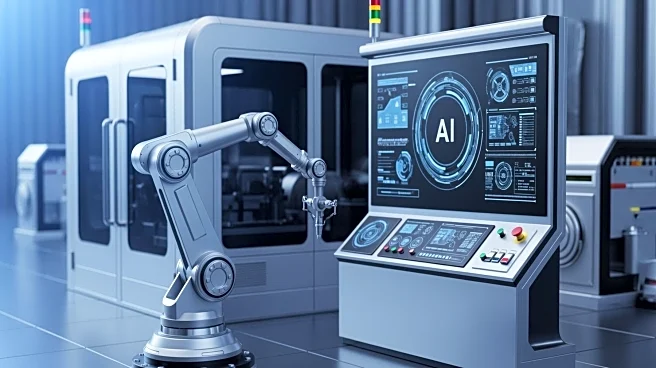What's Happening?
Manufacturers are increasingly adopting artificial intelligence (AI) to address various industry challenges, including supply chain disruptions, fluctuating consumer demands, and labor shortages. A significant
portion of manufacturers are investing in AI to enhance efficiency and reduce costs. Digital platforms like Xometry are facilitating this transformation by providing AI-driven solutions for sourcing and manufacturing custom parts. These platforms offer instant feedback on manufacturing feasibility, costs, and lead times, streamlining the procurement process and improving quality control.
Why It's Important?
The integration of AI in manufacturing is crucial for maintaining competitiveness in a rapidly changing global market. AI technologies enable manufacturers to optimize supply chains, predict costs, and improve sustainability by providing real-time insights into sourcing decisions. This shift towards AI-driven manufacturing is expected to generate significant productivity gains and cost savings, positioning companies to better meet consumer demands and achieve sustainability targets. The adoption of AI also addresses talent gaps by providing expertise and guidance in procurement and production processes.
What's Next?
As AI continues to transform manufacturing, companies are likely to expand their use of AI-powered platforms to enhance strategic sourcing and project management. The UK government is investing heavily in advanced manufacturing innovation, which may lead to further advancements in automation and digitization. Manufacturers are expected to focus on reshoring facilities to improve supply chain resilience and reduce environmental impact. The ongoing development of AI technologies will likely drive further improvements in efficiency, scalability, and sustainability within the industry.
Beyond the Headlines
The adoption of AI in manufacturing raises ethical and cultural considerations, particularly regarding workforce displacement and the need for digital skills. As AI technologies become more prevalent, manufacturers must address potential job losses and invest in training programs to equip workers with the necessary skills. Additionally, the focus on sustainability and transparency in supply chains may lead to increased regulatory scrutiny and pressure to meet environmental standards. These factors highlight the need for a balanced approach to AI integration that considers both economic and social impacts.









